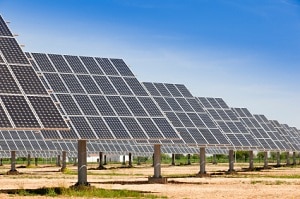 ‘Game-Changing’ Solar Tech Breakthrough Gets $150 Million Investment from the Department of Energy
‘Game-Changing’ Solar Tech Breakthrough Gets $150 Million Investment from the Department of Energy
Secretary of Energy Stephen Chu announced in June that a Massachusetts company has developed a ‘game-changing’ silicon solar wafer that could speed the adoption of solar technology by cutting the cost of solar cell manufacturing in half.
Traditional silicon wafers are sliced from large blocks, a process that results in up to a 50 percent loss in material and, as a result, isn’t very cost-effective. However, Lexington-based 1366 Technologies has developed a much more efficient process called Direct Wafer that casts new wafers individually to specific measurements.
Direct Wafer condenses four manufacturing steps into one, low-cost step. From a pool of molten silicon, a thin sheet of silicon is formed inside a furnace then removed and laser-trimmed to size. While conventional silicon wafer processing takes up to three days, the entire Direct Wafer process is completed in a fraction of the time. The revolutionary one-step process uses 90 percent less energy and results in a silicon wafer that can be used by any standard multi-crystalline cell manufacturer.
Direct Wafer was developed with support from a pilot program under the U.S. Department of Energy known as the Advanced Research Projects Agency’ Energy (ARPA-E). The program invests in innovation and “is looking for high-risk ideas that, if successful, can be high impact,” said program director Arun Majumdar.
The ARPA-E program made an initial $4 million dollar investment in 1366 Technologies in 2009. The company also received a $3 million grant from the Energy Department’s Solar Energy Technology Program. On June 17, Chu announced that ARPA-E had offered the company a conditional commitment for an additional $150 million loan guarantee. Chu said the funds will go toward the creation of a Direct Wafer project that will be capable of producing about 700 to 1,000 megawatts of silicon-based wafers annually.
New Process Could Help Solar Compete with Fossil Fuels ‘ If Adoption is Encouraged
If the projected cost savings of Direct Wafer are accurate, the process could make solar power affordable enough to compete with oil, coal, and nuclear power. However, long-standing barriers to widespread adoption of solar are still a concern for some industry insiders.
Brian Keane, president of Smart Power, a green energy marketing group, said that price and value were still two main areas of concern. Keane said that the primary value of solar is that it’s good for the environment, but that ‘quite frankly, no American actually thinks that’s good value.’
According to Keane, U.S. consumers need to be convinced of solar viability. “The perception is that solar is an idea from the 1970s that just didn’t work,” Keane said. ‘They think it’s not strong enough to power their lives, compared with oil, coal, and nuclear power.’
However, Keane added, cutting the price of manufacturing in half with the Direct Wafer process could go a long way toward helping marketers increase solar’s value proposition.
Other industry insiders point to general concerns in the marketplace as barriers to widespread adoption of new innovations like Direct Wafer. Lew Milford, president of the Clean Energy Group, a non-profit energy and climate advocacy group, said that many new and innovative technologies ultimately fail because they never reach the point of commercialization, where products are introduced, marketed, and sold to consumers.
Milford described the point between a technology’s initial round of funding and commercialization as the “valley of death” for innovative technology companies. Milford suggested that effective commercialization for an ARPA-E technology investment such as Direct Wafer would have to come from state governments, whose policies supporting clean energy in order to create jobs and strengthen economies would build incentives for adoption.
Majumder, who said that ARPA-E already has a close relationship with the states, said that his primary concern with the adoption of solar had to do instead with the decline in U.S. manufacturing. According to Majumder, the United States produced 40 percent of global photovoltaic cell manufacturing in the 1990s, a number that has dwindled to just 5 percent today. Majumder said that the United States could get the manufacturing and technology lead back, but that regaining the lead would be based on U.S. innovations such as Direct Wafer.
Sources
DOE Offers $150 Million Conditional Commitment for a Loan Guarantee to Support Breakthrough Solar Manufacturing Process, U.S. Department of Energy press release, June 17, 2011.
Department of Energy Makes $150M Bet on Solar Tech, The Huffington Post, June 17, 2011.



